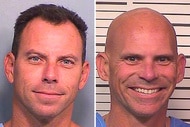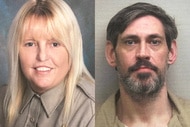Create a free profile to get unlimited access to exclusive videos, breaking news, sweepstakes, and more!
Kim Potter Jury Arrives At 'Outcome' In Trial For Daunte Wright's Shooting
The court did not immediately respond to questions on whether a trial outcome is a verdict.

The jury reached a trial outcome Thursday in the manslaughter trial of the suburban Minneapolis police officer who shot and killed Black motorist Daunte Wright after she says she mistook her gun for her Taser.
The court did not immediately respond to questions on whether a trial outcome is a verdict. The jury began deliberations in the case against Kim Potter on Monday. The outcome will be read in court between 1:30 p.m. and 2 p.m. CST.
Jurors on Thursday had resumed deliberating for a fourth day at the manslaughter trial of the suburban Minneapolis police officer who shot and killed Black motorist Daunte Wright, with questions looming over how the judge will handle the case if the day ends without a verdict ahead of the Christmas holiday weekend.
The jurors at former Brooklyn Center officer Kim Potter's trial have been sequestered since deliberations began Monday, meaning they've been under the court's supervision and staying at an undisclosed hotel until their work is done. A court spokesman said that if there isn't a verdict by the end of the day, though, Judge Regina Chu planned to let them spend the long holiday weekend at home before returning Monday.
Attorneys who aren't involved in the case said breaking sequestration would be highly unusual and could lead to a mistrial.
"I've never heard of that in my life," said Marsh Halberg, a Minneapolis criminal defense attorney who has been watching the case. "The whole idea of sequestering is that you don't interact with other people and have outside influences that are intentional or unintentional. Now that goes out the window."
Halberg said Chu could declare a mistrial as an alternative to reversing her sequestration order.
On Tuesday, jurors asked Chu what would happen if they couldn't reach a verdict and she told them to keep trying. They had no questions on Wednesday or early Thursday.
Potter, 49, said she meant to use her Taser on Wright rather than her gun. She is charged with first- and second-degree manslaughter. If convicted of the most serious charge, she would face a sentence of about seven years under state guidelines, though prosecutors have said they will seek more.
In August, Chu ruled that the jury would be sequestered during deliberations — meaning jurors would remain under the court's supervision in an undisclosed hotel and couldn't return home until they reached a verdict or she determined they couldn't reach one.
However, Chu told the jurors during jury selection that they would have time off on Christmas Eve and over the Christmas weekend. Court spokesman Nik Nadeau said the judge intends to stick to that plan.
Chu would have to un-sequester them over the holiday weekend — likely with very strict rules — and then sequester them again on Monday.
Halberg said if that happens, Potter's lawyers would likely object and it would be a good appeal issue for them if she is convicted after the holiday. However, prosecutors could argue that it would be speculation that the holiday break hurt the jurors' ability to consider the case fairly.
But Halberg said alternatively, if Chu were to tell members of the mostly white jury that they have to remain sequestered through the long weekend after telling them at the start that they would have the time off, that could also be appealable if they come back with a conviction.
Mike Brandt, another Minneapolis attorney following the case, agreed that having the jury work over Christmas would be "devastating." But he said he sees a problem with breaking the jury's sequester because it goes against what sequestration is all about.
He said under the rules of criminal procedure, sequestration is ordered when a case is of such notoriety that highly prejudicial matters are likely to come to the jurors' attention if they aren't sequestered.
"This case fits smack dab into that. … The whole idea of sequestration is they don't want these jurors to get outside influences," Brandt said.
During closing arguments, prosecutors accused Potter of a "blunder of epic proportions" in Wright's death during an April 11 traffic stop, but they said making a mistake was no defense.
Potter's attorneys countered that Wright, who was attempting to get away from officers as they sought to handcuff him for an outstanding warrant on a weapons charge, created the conditions that led to his own death.
Wright's death set off angry protests in Brooklyn Center just as nearby Minneapolis was on edge over the trial of another white officer in the killing of George Floyd.
Potter, who resigned two days after Wright's death, testified Friday that she "didn't want to hurt anybody" and that she was "sorry it happened."
Chu told jurors that the state doesn't have to prove that Potter tried to kill Wright.
The judge said for first-degree manslaughter, prosecutors must prove that Potter caused Wright's death while committing the crime of reckless handling of a firearm. This means they must prove that she committed a conscious or intentional act while handling or using a firearm that creates a substantial or unjustifiable risk that she was aware of and disregarded, and that she endangered safety.
For second-degree manslaughter, prosecutors must prove she acted with culpable negligence, meaning she consciously took a chance of causing death or great bodily harm.
State sentencing guidelines call for just over seven years in prison upon conviction of first-degree manslaughter and four years for second-degree, but prosecutors have said they plan to push for longer sentences.






















